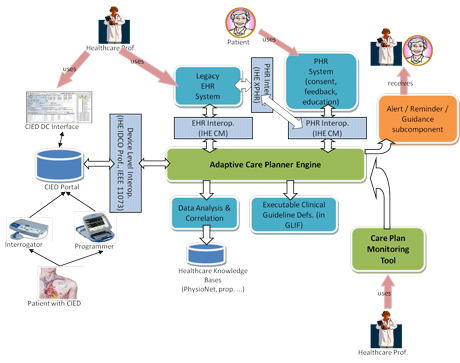by Asuman Dogac, Gokce Laleci and Catherine Chronaki
The guideline-driven approach of iCARDEA (An Intelligent Platform for Personalized Remote Monitoring of the Cardiac Patients with Electronic Implant Devices) capitalizes on interoperability standards to semi-automatically process patient data from hospital-based health records, remotely monitored implants and personal health records, and promote context-aware personalized and participatory care through the intelligent management of patient information. At the same time it targets reduction of unnecessary in-patient follow-up visits, increased quality of life and patient safety.
A recent consensus statement by the Heart Rhythm Society and the European Heart Rhythm Association reports more than 800,000 patients in Europe have Cardiovascular Implantable Electronic Devices (CIEDs) for the treatment or secondary prevention of cardiac arrhythmias [1]. With current guidelines dictating in-patient follow-up every 3-6 months, the current estimate of 5.8 million visits per year in the EU can only increase, thus increasing the burden on the healthcare system.
While remote monitoring of implants offers a potential solution, many cardiac implantation centres have not yet established work protocols to deal with remote monitoring data, the newest addition to a long list of disparate sources of patient-related information. The integrated guideline-driven approach of iCARDEA builds on interoperability standards to contribute to quality-driven, time- and cost-effective healthcare processes that uphold patient safety, deliver high quality care, and save physicians’ precious time.
iCARDEA, a project cofounded by the European Commission for 2010-13 [2], develops an intelligent platform that aims to semi-automate the follow-up of CIED patients through context-aware adaptable computer interpretable guideline models. The models incorporate information from CIED implants, Electronic Health Records (EHRs) and Personal Health Records (PHRs), reducing in-patient visits and providing decision support to health professionals within the chain of care whilst promoting patient safety and reaping the benefits of collaborative and participatory care. iCARDEA exposes the CIED interfaces using health information technology standards developed by HL7 and ISO/IEEE 11073, through appropriate IHE IDCO, CM, and XDS integration profiles [3]. The IHE Exchange of Personal Health Record Content (XPHR) Profile is being implemented in iCARDEA for PHR-EHR interoperability.

Figure 1: Architecture of the iCARDEA platform.
iCARDEA has designed a component based architecture that may be adapted for different health care settings. The basic components shown in Figure 1 are:
- CIED data exposure service (led by OFFIS, Germany): The CIED data exposure services are based on the IHE IDCO profile based on HL7 v2.5/6 to retrieve remote monitoring reports from CIEDs from two major manufacturers, namely, Medtronic and St. Jude Medical, who are participating in the project.
- Adaptive Care Planner and Patient Monitor (led by SRDC, Turkey): In iCARDEA, the remote follow-up of CIED patients is coordinated through the Adaptive Care Planner component. The care processes are defined as care pathways using “computer interpretable clinical guideline models”. Using the information obtained from CIEDs, EHRs and PHRs of the patient, clinical guidelines interact with modular healthcare processes to perform various functions, for instance to invoke a service to assess critical situations for early diagnosis to prevent health complications. So far, SRDC, Turkey with the active support of clinical partners (SALK in Austria and Barcelona Clinics in Spain) have developed a semi-automated guideline for Atrial Fibrillation [3], while additional guideline models for ventricular tachycardia are currently been studied.
- EHR Interoperability Framework (led by FORTH-ICS, Greece): The EHR interoperability framework is a toolbox that enables patient related information referenced in guidelines to be seamlessly and intelligently retrieved and used in a dynamic personalized and adaptable workflow for clinical follow-up. This toolbox exposes legacy EHR systems through standard interfaces dictated by established IHE profiles for Patient Care Coordination and Care Management, and Cross Enterprise Document Sharing. In addition the HL7 CTS 2 service is used to leverage differences in terminology and a security layer supports the local security policy.
- Patient Empowerment Platform and Consent Editor (led by Salzburg Research, Austria): The Patient Empowerment platform aims to provide feedback, education on patients’ cardiac problems and communication with the care givers. In this way, iCARDEA provides feedback and education to the patients through a Personal Health Record (PHR) component so that they can gain the benefits of having their healthcare records and CIED data in a format easily accessible to them. The PHR system also supports patient privacy by having the patient consent on the type of data about him or her to be collected and the way in which the data will be used. Thus, the consent editor nurtures patient empowerment by enabling the dynamic definition of privacy preserving rules that build trust and confidence.
Validation of iCARDEA results
The iCARDEA services will be validated through pilot deployment activities in Austria in the latter part of 2011/12 to confirm that remote monitoring of CIEDs as an integral part of collaborative patient care requires investment in interoperability and process re-engineering, but can lead to significant savings in physicians’ time, while contributing to improved patient comfort, safety, and quality of life.
Links:
[1] http://www.hrsonline.org/policy/clinicalguidelines/ cieds_consensus.cfm
[2] http://www.srdc.com.tr/icardea
[3] http://www.ihe.net/profiles/index.cfm
Please contact:
Asuman Dogac
Project Coordinator
SRDC Ltd, Ankara Turkey
Tel: +90 312 210 1393
E-mail:
Catherine Chronaki
FORTH-ICS, Greece
E-mail:










